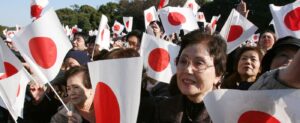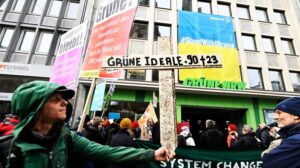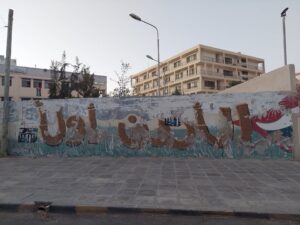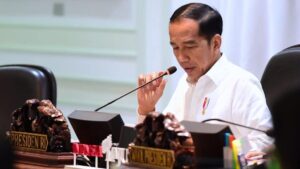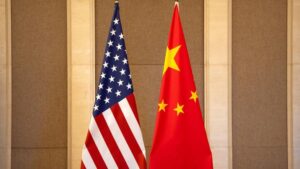Indonesia’s Democracy: Promises, Stagnancy, and Regression
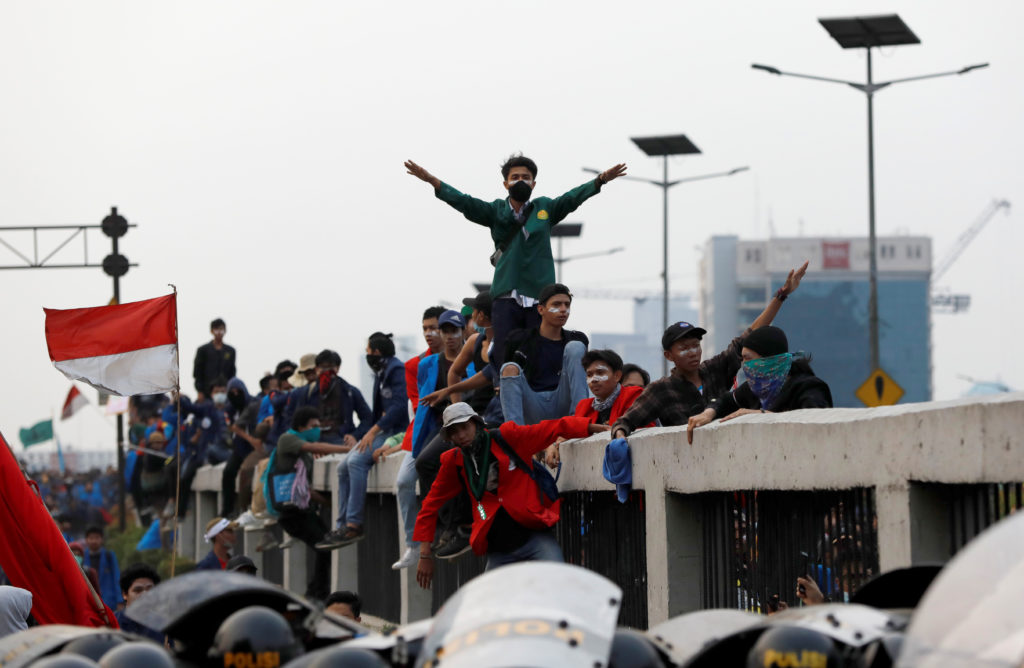
Illustration of niversity students protest in Jakarta, Indonesia September 24, 2019. Foto: Willy Kurniawan/REUTERS
On July 23, the government responded to a mass protest plan mobilised by Student Political Block (BPP) with personal intimidation and arrest from the state apparatus of violence. The government accused their activity as an initiator of the protest called “Jokowi EndGame” on June 24. In Jakarta, the police came to the BPP members’ houses. In Cirebon, two of BPP’s members got arrested until July 28. The Student Political Block is a collective group crystalised into a permanent youth organisation after two waves of civil demonstrations called #ReformasiDikorupsi and #GagalkanOmnibusLaw. The existence of this group is a manifestation of the resistance of democratic wings from civil society in Indonesia towards the ruling class.
In 2020, the ruling class through the Ministry of Political, Legal, and Security Affairs, Mahfud MD, announced to the public about the ban on Islamic Defenders Front (FPI), following the prohibition of its ally, Hizbut Tahrir Indonesia (HTI), through Aksi Bela Islam in 2017. Recently, Habib Rizieq, the religious leader of FPI, was sentenced to eight months in prison after a Jakarta court sentenced him guilty of disobeying health protocol during the Covid-19 pandemic. Both organisations represented as an Islamic right-wing opposition from civil society that consistently showed resistance towards the ruling class. Sometimes, they showed their ideology against democracy.
However, the government’s method of limiting democratic space is a development that did not emerge singly. It was born from the contradiction between two or more interest groups in the state’s political dynamics. In Indonesia, its development must be traced from several years back, at least in the era of Jokowi. This anti-democratic symptom’s gestation on the current situation cannot be separated from the dynamics of the contradiction between the ruling class and civil society.
The writer tried to analyse why democratic spaces are getting worse in Jokowi’s era in Indonesia by using the principal method of democratic regression. This theory explains the presence of symptoms that characterise democratic regression: gradual strangulation of democracy by elected (typically populists) executives who gradually eviscerate institutional checks, political opposition, independent media, and other forces of scrutiny and resistance in civil society (Diamond, 2021). In this essay, the writer only used two variables of the theory to analyse how tight Jokowi’s ruling class regressed democratic spaces. Firstly, how the ruling class is trying to strangle the forces of scrutiny and resistance in civil society, focusing on the responses of Jokowi’s government to mass action. Secondly, the existence of opposition parties.
Promise and Reality during Jokowi’s Era
Before the first election, Jokowi promised that he would be fixing the democratic problems in Indonesia. One of the biggest democratic promises on his first presidential campaigns was resolving past human rights cases, such as Tragedi Semanggi I & II, the kidnapping of Reformasi’s activists, and the mass killing of ’65 Suharto’s era. After 11 years of consistently demanding justice through the organised Kamisan, a peaceful protest in front of the presidential palace, the family of human rights violation victims in the past finally met Joko Widodo on May 31, 2018. Yet, there is no sign of those cases going to the following stages.
The second evidence led to Jokowi’s response to the Jakarta Protest (Aksi Bela Islam), a protest mobilised by right-wing Islamic fundamentalist groups against Ahok (one of Jakarta’s Governor candidates). According to the right-wing group, Ahok’s speech contained religious blasphemy in the 2017 Jakarta election campaign, and the speech video went viral. At that time, Jokowi said that he ‘did not want to save Ahok’.
Jakarta Protest was the turning point for Islamic fundamentalism groups with more conservative thoughts to rise in Indonesia, including their role in the political contestation. Considering this, Jokowi did not try to stop the movement with clear statements to save democracy. On May 9, 2017, Basuki Tjahya (Ahok) was sentenced guilty of religious blasphemy. Since Ahok was found guilty by Jakarta’s court, the political landscape was marked by religious jargon, including the presidential election. Prabowo, one of the powerful oppositions in the 2019 presidential election, tried to use the movement to increase his electability, riding on the racist campaign by Islamic groups (The Asean Post, 2019). However, Jokowi won his second election after cracking the Muslim voters by choosing Ma’ruf Amin to be his mate. Finally, the swing voters from Nahdatul Ulama and Muhammadiyah voted Jokowi-Ma’ruf Amin (Watchdoc, 2020).
After the election, Jokowi and Prabowo succeeded in doing rapprochement. As a result, 13 parties stood behind President Joko Widodo, and three others were outside the government. Not long after that, this incumbent alliance gave a huge opportunity to the ruling class in parliament to ratify many controversial bills that brought the civil society (NGO, students, and labour union) going in for the protest at the end of 2019.
The protest in 2019 was called #ReformasiDikorupsi—demanded to revoke a law weakening the Corruption Eradication Commission (KPK) that Jokowi’s government presented to the parliament, legalisation of the Anti-Sexual Violence Bill, to end the military occupation in Papua and West Papua provinces that has been increasing since the Papuan Uprising. These demands show that this movement brought a democratic agenda. The second wave movement is widely known as #GagalkanOmnibusLaw, a movement responsible for the ratification of the Omnibus Bill that they thought would eradicate the rights of the working class, peasants, informal workers, etc.
The ruling class responded to the first wave by using repressive methods in a few regions, specifically in Jakarta. As reported by the Legal Aid Institute (LBH) Jakarta (2020), in this city, the police responded to the protester with violence, utilising its fully equipped force while also arresting hundreds of demonstrators. On the contrary, in Yogyakarta, the demonstration went relatively calm. From another point of view, these protests were without national coordination with leading by mass organisations. It purely emerged spontaneously on local coordination—students played a significant role in this first wave.
A few months before the #ReformasiDikorupsi uprose on a national scale, repression was carried out systematically by the national government in response to the Papuan Uprising. This movement was carried out by the Papuan people in West Papua and Papua Provinces after the racism of the police, military, and civil militia in Surabaya towards the Papuan students (Koman, 2020). Jakarta responded by sending the police and military reinforcements from outside Papua, accompanied by an internet shutdown throughout Papua for days. It was the only systematic repression obviously shown by the central government. It could be seen through Jokowi’s speech during the uprising. He ordered the head of national military (TNI), Chief of the Indonesian National Police (Polri), Ministry of Political, Legal, and Security Affairs (Menkopolhukam), and Commander of the Indonesian National Armed Forces (Panglima TNI) to ‘take a decisive action’ towards the protestors that caused riots. During that uprising, 46 civilians died, and 148 were injured in Wamena and Jayapura (Koman, 2020).
Indonesia in Present: Democratic Regression and Still Continuing
As Lenin has (2008) explained, “state is a product and a manifestation of the irreconcilability of class antagonism.” To be more specific, to clarify the manifestation of class antagonism in Indonesia recently, Chandhoke (2007) explained that contradictions between the public and the ruling class are inevitable when formal state institutions and their parties can no longer influence the public trust. That is the primary reason why public participation using mass mobilisation is inevitable. On the other hand, when the protest becomes a popular political practice, it can also reveal the character of bureaucratic politics inside the ruling class (Karl D. Jackson & Lucian W. Pye, 1978).
According to Lorimer (1999), social movement can effectively give political pressure, even revolutionary change, when objective conditions and subjective factors have already been fulfilled. Both correlate with each other. Objective conditions mean general crises in the obsolete system. Crises are not only about the economy, but they also include socio-political conditions, and above all, the development of class contradictions, the alignment of class forces. Yet, it is supposed to be noted that even though objective conditions are present, the result of social change depends on subjective factors.
Subjective factors lead to the leadership of a movement—that could provide the right strategy of the resistance. This variable is crucial if we are trying to connect to the objective conditions because the leadership of a movement must be able to analyse the development of objective conditions. Lorimer also noted that revolutionary consciousness of the masses is also essential—this is related to the desire of the masses (peoples) to get out of oppressive conditions. In line with Lorimer, Anyon (2005) also noted that concerted protests could foster elites’ destabilisation and stimulate change.
Fealy (2020) argued that COVID-19 made democracy regress in Indonesia, and the government has become more overbearing. Well, it is true, but only a partial analysis. Based on the writer’s explanation about the contradiction between the ruling class and civil society, shown in the dynamic of mass actions, symptoms of regression on democratic space for the civil society already have emerged since Jokowi’s first reign. It started from democratic stagnation when Jokowi did not give a clear statement to save democracy when right-wing Islamic fundamentalists upraised and spread their racist agitation among wider Muslim populism. Hadiz (2018) called this phenomenon an illiberal democracy. This ‘stagnation’ shifted into democratic regression when Jokowi gave a signal to entirely repress the Papuan Uprising movement in August 2019, which continued to the next mass protest on #ReformasiDikorupsi and #GagalkanOmnibusLaw with repressive action led by local authorities.
At present, those civil society organisations are effectively silenced by three-way different methods of ruling class. For the right-wing Islamist groups represented by FPI, Jokowi’s ruling class used semi-systematic national oppression by declaring that the organisation is unlawful and criminalising its leader using a health quarantine policy. A few NGOs such as LBH Jakarta, Lokataru and many individual academies, recently criticised that kind of policy as an effective tool to decline democratic space. However, there is no significant impact to stop the political activity of FPI’s members. As reported by Tempo (2021), the ex-members of FPI still can run the political activity after the central government banned their organisation, but not wearing their political attributes.
It is hardly surprising that the systematic, centralised method of repression to the democratic wings only happened to the Papuan movement. It happened because the struggle of Papuan people at least already concentrated inside the permanent organisations. At least they have a central mass organisation under the National Committee for West Papua (KNPB). This organisation also has a military wing called National Liberation Force for West Papua (TPN-PB). Their main expression was manifested in the struggle for the right to self-determination. The systematic oppression response to the protest of Papuan civilians can see in Tapol’s (Koman, 2020) report:
“At least an extra 6,500 police (mainly Brimob) and military (TNI) personnel were deployed into West Papua to crush the Uprising. The civilian death toll during this period reached 61 people, including 35 indigenous West Papuans. Of those 35 people who died, 30 had sustained bullet wounds, suggesting that the Indonesian security forces killed them. Three other deaths were from stab wounds inflicted by militias, while the causes of two other deaths are unclear. Militias were used by the security forces on two of the three occasions when the Morning Star flag, representing West Papuan independence, was raised on public buildings.
…
During the Uprising, there were 13 attacks against press freedom, including an internet shutdown, and 23 attacks against human rights defenders, including one physical attack and nine cases of judicial harassment. The internet shutdown was ruled as unlawful by the state administrative court in Jakarta in June 2020.”
This report shows the systematic combination with regressing democratic spaces using offline and online approaches—sending 6,500 police and military personnel from outside West Papua land and shutting down the internet. Both political approaches directly were controlled by the central government and could effectively moderate the uprising in a month.
As for democratic wings outside Papuan issues, civil society opposition just focused on response against the government policies without trying to touch the ruling class political area. It means, the civil society still has no strong imagination that escalates to the masses to talk about building their own party to challenge the incumbent with an alternative agenda. They can immediately gather to build a front when the government plans a controversial policy. However, it suddenly vaporised when the ruling class beat them using state violence tools such as the police. This fact indirectly plays a role to pave the way for the ruling class to regress democratic space for the public. For more specific talking about oppression methods, the ruling class did not need systematic oppression because the movement is not built for systematic political agenda.
On mass mobilization perspective, the youth movement are playing an important role to be the opposition on political dynamics in Indonesia this present. It is makes sense because public on majority did not have political party to bring their own agenda. In this situation, it also means that there is a vacuum of leadership for the masses, resulting in a void of injection of understanding towards the analysis of objective conditions. Learn from the history of Indonesian movement, mobilizations by students often added to the critical mass or helped prepare a conductive political atmosphere (Lane, 2010). There is unpleasant situation for democratic struggle if the civil society consistently hanging the fate of democratic space to the students without clear perspective of democracy. Because the opposition of bourgeois class can take the advantages of spontaneous movement for their own political agenda.
The Upcoming Oppositions?
Almost in line with Kusuma (2021), he stated in his essay entitled “Overcoming Post-Democratic Phenomenon in Indonesia After Pandemic COVID-19” that democracy reinforcement can be done by strengthening the opposition party. The problem is that there are no opposition parties in the current parliament who are seriously fighting for democracy. Political party opposition represented by the Democratic Party (Demokrat) and Justice and Prosperity Party (PKS) has no serious political pressure towards the majority ruling class that already consolidated in the first year of Jokowi’s second period. In fact, PKS often shows the symptoms of resistance to democracy. For instance, taking from Jones (2014), PKS is the strongest stronghold for HTI’s agenda to influence the Muslim society.
On the other hand, Democratic Party only uses democratic space to move freely, many times just for a rhetorical polarisation tactic for jacking up their electability (Lane, 2021) (Wicaksono, 2021). Maneuvers among electoral political parties without an ideological base have become the mainstream strategies to gain voters on formal electoral in Indonesia since Reformasi (Edward Aspinall & Ward Berenschot, 2019). For instance, Prabowo with his party, Gerindra, is competing Jokowi in the presidential election 2014 and 2019. Before both elections, Prabowo was a running mate of Megawati (PDI) in the presidential election 2009. But, six months after the last elections, Prabowo join the Jokowi’s administration. In line with (Mudhoffir, 2021), the absence of long-term political strategy giving the consequences to the sporadic and reactionary concept of mass movement. It makes sense that the ruling class’s sporadic approach to oppress the political opposition on a democratic wing is the best choice.
However, at least two permanent non-electoral organisations that constantly explain the objective conditions and pour it consistently on their newspapers—Association of Socialist Revolutionary (PSR) and Socialist Union (PS). Both organisations have an alternative perspective and vision about what kind of Indonesia’s democracy is in the future by elaborating their perspective periodically through their mass media—newspapers and online media. Besides both organisations, there is another new political party to face the next election called PRIMA, a small party led by elements who stand still for electoral strategy from the original Peoples’ Democratic Party (PRD) of the 1990s (Lane, 2021). Stands for five missions—social welfare, democracy, gender equality, and appreciating the environment, this party is already working to gain the voters for election since 2020. Nevertheless, their influence is still barely significant among the popular mass of the democratic wing. Predictably, the ruling class will continue to regress democracy if the democratic wing consistently uses the same strategy to fight for democracy.
Conclusion
Democratic spaces show its regression since the end of Jokowi’s first term of his presidency. The regression of democratic spaces can be seen clearly in the ruling class’s approaches to deal with mass action from civil society. The existence of the ruling class strangles the forces of scrutiny and resistance in civil society in the present, can be shown in a three-ways method of repression—systematic, semi-systematic, and non-systematic. Systematic repression to the democratic activity done by the ruling class to respond to the Papuan movement. Semi-systematic repression was done by the ruling class to respond to the activity Islamic right-wing fundamentalism. Non-systematic oppression was done by the ruling class to deal with democratic wing from civil society outside the Papuan issue.
On the other hand, the political opposition is taking advantage of democratic spaces for the result of the Reformasi showing its positive trend, but still cannot save the democratic space at the grassroots. It can happen because of two things. Firstly, political parties’ opposition that exist in parliament has no serious response toward democratic regressions at the grass roots level. Secondly, political parties that have an alternative perspective on democracy, still barely have a significant influence towards the majority society. Predictably, the ruling class will continue to regress democracy if the democratic wing consistently uses the same strategy to fight for democracy.
References:
Anyon, J. (2005). Radical Possibilities: public policy, urban education, and a new social movement. New York and London: Routledge.
Arif Maulana, Pratiwi Febri, et.al. (2020). Reformasi Dikorupsi, Demokrasis Direpresi. Jakarta: Lembaga Bantuan Hukum (LBH) Jakarta .
Chandhoke, N. (2007). “Civil Society”. Development in Practice, Vol 17, No. 4-5, 607-614.
Diamond, L. (2021). Democratic regression in comparative perspective: scope, methods, and causes. Democratisation, Vol 28, No. 1, 22-42.
Edward Aspinall and Ward Berenschot. (2019). Democracy for Sale: Elections, Clientelism, and the State in Indonesia. Ithaca & London: Cornell University Press.
Edward Aspinall and Ward Berenscot. (2019). Democracy for Sale: Elections, Clientelism, and the State in Indonesia. New York: Cornell University Press.
Hadiz. V. R. (2018). Imagining All the People? Mobilising Islamic Populism for Right-Wing Politics in Indonesia. Journal of Contemporary Asia, Vol. 48, No. 4, 566-583.
Koman, V. (2020). The 2019 West Papua Uprising: Protest against racism and for self-determination. London: TAPOL.
Kusuma, D. A. (2021). Upcoming Post-Democratic Phenomenon in Indonesia After Pandemic COVID-19. South Jakarta: Kontekstual.
Lane, M. (2021). The Democrat Party Split: Dynastic versus All-Party Politics. Heng Mui Keng Terrace, Singapore: ISEAS Publisher.
Lane, M (2021). Political Parties’ Manoeuvering after the Jokowi-Prabowo Rapprochement. ISEAS Perspective. Issue: 2021 No. 73.
Lane, M (2010). Indonesia and The Fall of Suharto: Proletarian Politics in the “Planet Slums” Era. Working USA ; Armonk Vol. 13, Iss. 2, (Jun 2010): 185-200.
Lenin, V. I. (2008). Revolution, Democracy, Socialism: Lenin’s Selected Writings, 1895-1923. Chippenham and Eastbourne: Pluto Press.
Lorimer, D. (1999). Fundamentals of Historical Materialism (1st ed.). Resistance Book.
Mudhoffir, A M. (2021). Aktivisme Borjuis: Mengapa Kelas Menengah Reformis Gagal Mempertahankan Demokrasi. https://projectmultatuli.org/aktivisme-borjuis-kelas-menengah-reformis-gagal/.
Wicaksono, R. A. (2021). Kemelut Partai Demokrat: Episode Baru Drama Elit Indonesia. Opini.id. https://opini.id/sosial/read-16326/kemelut-partai-demokrat-episode-baru-drama-elit-indonesia?page=all
Antaranews. (2021, July 24). 3.385 personel gabungan kawal demo tolak PPKM di Jakarta. https://www.antaranews.com/berita/2285742/3385-personel-gabungan-kawal-demo-tolak-ppkm-di-jakarta.
BBC. (2017, May 9), Jakarta governor Ahok found guilty of blasphemy. https://www.bbc.com/news/world-asia-39853280.
BBC Indonesia. (2016, November 6), Jokowi: ‘Saya tidak akan melindungi Ahok’. https://www.bbc.com/indonesia/indonesia-37906216.
Laman Internet
CNN Indonesia. (2020, December 30). Pemerintah Tetapkan FPI Organisasi Terlarang. https://www.cnnindonesia.com/nasional/20201230123409-20-587792/pemerintah-tetapkan-fpi-organisasi-terlarang.
Devy Ernis. (2021, January 9). Pengajian Tanpa Bintang Hijau. Tempo. 11-17 Januari 2021.
Liputan6. (2020, October 15). Polda Metro Cari Pihak yang Ajak dan Provokasi Pelajar Demo Omnibus Law. https://www.liputan6.com/news/read/4383140/polda-metro-cari-pihak-yang-ajak-dan-provokasi-pelajar-demo-omnibus-law.
Jakarta Globe. (2021, May 27). Rizieq Sentenced to Eight Months in Jail for Health Protocol Violations. https://jakartaglobe.id/news/rizieq-sentenced-to-eight-months-in-jail-for-health-protocol-violations.
Kompas. (2019, August 30). Ini 4 Pernyataan Jokowi untuk Penanganan Kerusuhan di Papua. https://www.kompas.com/tren/read/2019/08/30/072711865/ini-4-pernyataan-jokowi-untuk-penanganan-kerusuhan-di-papua?page=all.
KompasTV. (2021, July 24). Demo Tolak PPKM Yogyakarta: Tak Efektif Turunkan Kasus, Justru Sengsarakan Ekonomi Masyarakat. https://www.youtube.com/watch?v=nCZVZNMt0gY.
Tempo. (2020, October 11). Jokowi Respon Demo Omnibus Law, Koalisi Sipil: Pernyataan Presiden Menyesatkan. https://nasional.tempo.co/read/1394883/jokowi-respon-demo-omnibus-law-koalisi-sipil-pernyataan-presiden-menyesatkan.
Tempo. (2020, October 8). Demo Omnibus Law Ricuh, Sultan HB X: Yogya Tak Diciptakan Untuk Anarki. https://nasional.tempo.co/read/1394268/demo-omnibus-law-ricuh-sultan-hb-x-yogya-tak-diciptakan-untuk-anarki.
Tempo. (2021, July 27). Penangkapan Blok Politik Pelajar, YLBHI: Jika Tak Jelas Tuduhannya Seperti Teror. https://nasional.tempo.co/read/1394883/jokowi-respon-demo-omnibus-law-koalisi-sipil-pernyataan-presiden-menyesatkan.
The Sidney Morning Herald. (2019, October 22). From enemies to allies in six short months: Jokowi to invite Prabowo into cabiner. https://www.smh.com.au/world/asia/from-enemies-to-allies-in-six-short-months-jokowi-to-invite-prabowo-into-cabinet-20191022-p532vf.html
Watchdoc Documentary. (2020). Unfinished Indonesia. Central for Religious and Cross-cultural Studies (CRCS) UGM, Pardee School of Global Studies – Boston University, and Watchdoc. https://www.youtube.com/watch?v=5UofOIlOfIU&t=837s
Rizaldi Ageng Wicaksono is a Law student at Universitas Islam Indonesia. He can be found on Instagram with the username @rizaldiaw

